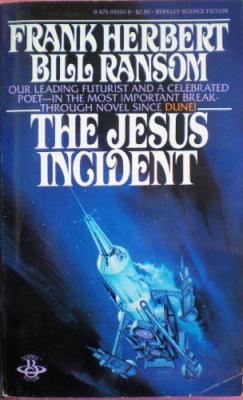 The Jesus Incident by Frank Herbert, Bill Ransom
The Jesus Incident by Frank Herbert, Bill Ransom

The Jesus Incident
by Frank Herbert, Bill Ransom
Original Price: ¥550 Discount: 15%
SCIENCE FICTION: PAPERBACK: used - acceptable
ENGLISH
A sentient Ship with godlike powers (and aspirations) delivers the last survivors of humanity to a horrific, poisonous planet, Pandora-rife with deadly Nerve-Runners, Hooded Dashers, airborne jellyfish, and intelligent kelp. Chaplain/Psychiatrist Raja Lon Flattery is brought back out of hybernation to witness Ship's machinations as well as the schemes of human scientists manipulating the genetic structure of humanity.
The book deals with concepts such as artificial intelligence, worship, resource allocation, and religious violence. Clones and genetic engineering take up themes of racism. One of the major themes is leadership and how the values of leaders influence a society through the actions and narratives of a society's leaders. Another is the nature and definition of God. There are echoes of Herbert's exploration of the effect of greed on the leaders within a society and how greedy leaders will warp a society in order to consolidate their own power, a theme in the Dune books as well as The Dosadi Experiment (1977).
The book makes several references to Frankenstein, as an analogy to the relationship between Ship and humans. The book takes it a step further demanding that humans take responsibility for their creation by realizing Ship is a human artifact and its omnipotence ultimately sprang from human hands. This is what Ship meant when it demanded worShip.
We have this title in stock at our house in Chitose Hokkaido and can ship it directly to you now.
♥ 7 LIKES
BOOK COVER: The cover is taken from google book search unless otherwise noted.
DISCOUNT: 15% OFF
 “Little islands are all large prisons; one cannot look at the sea without wishing for the wings of a swallow.” - Sir Richard Francis Burton
“Little islands are all large prisons; one cannot look at the sea without wishing for the wings of a swallow.” - Sir Richard Francis Burton